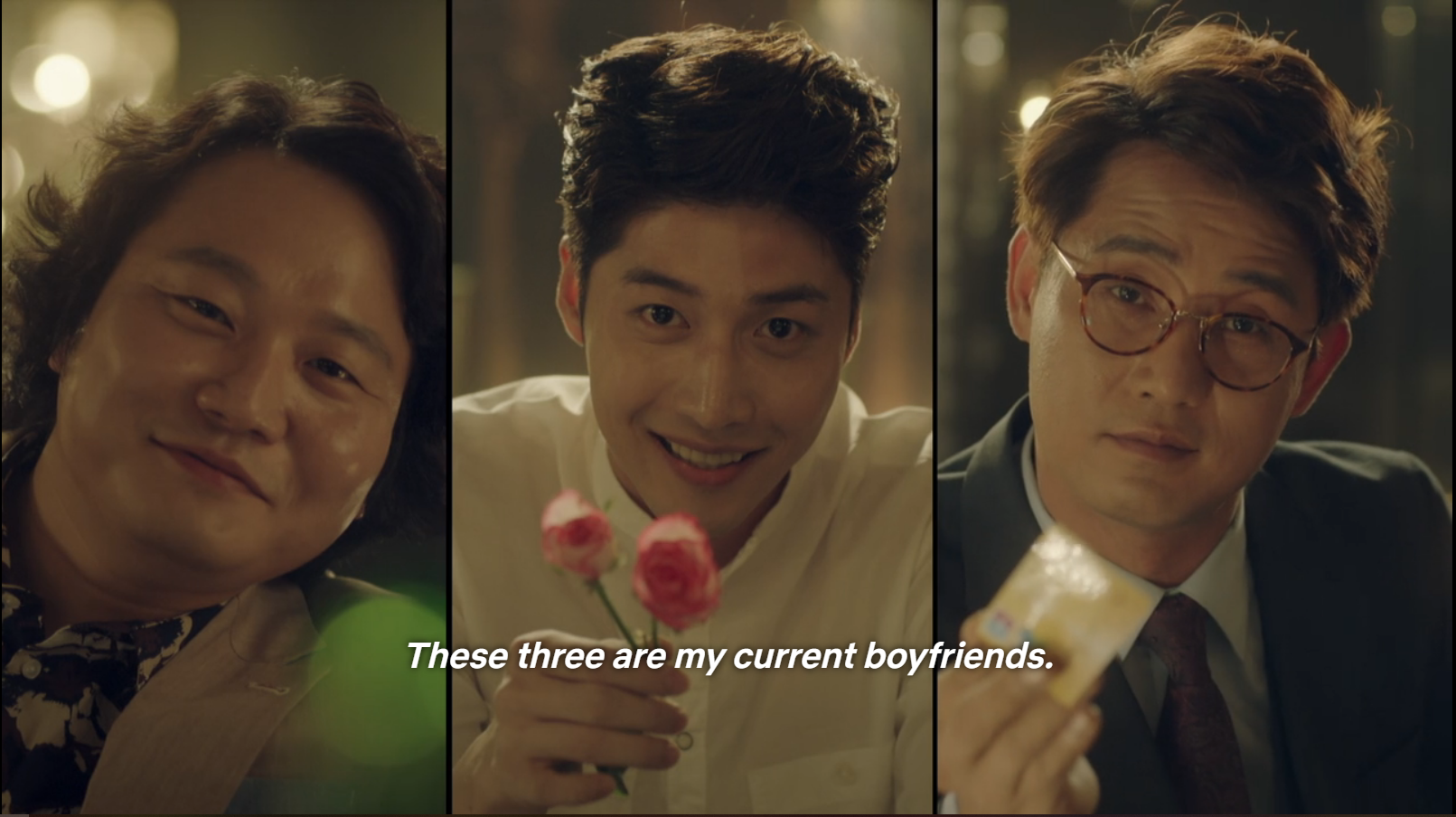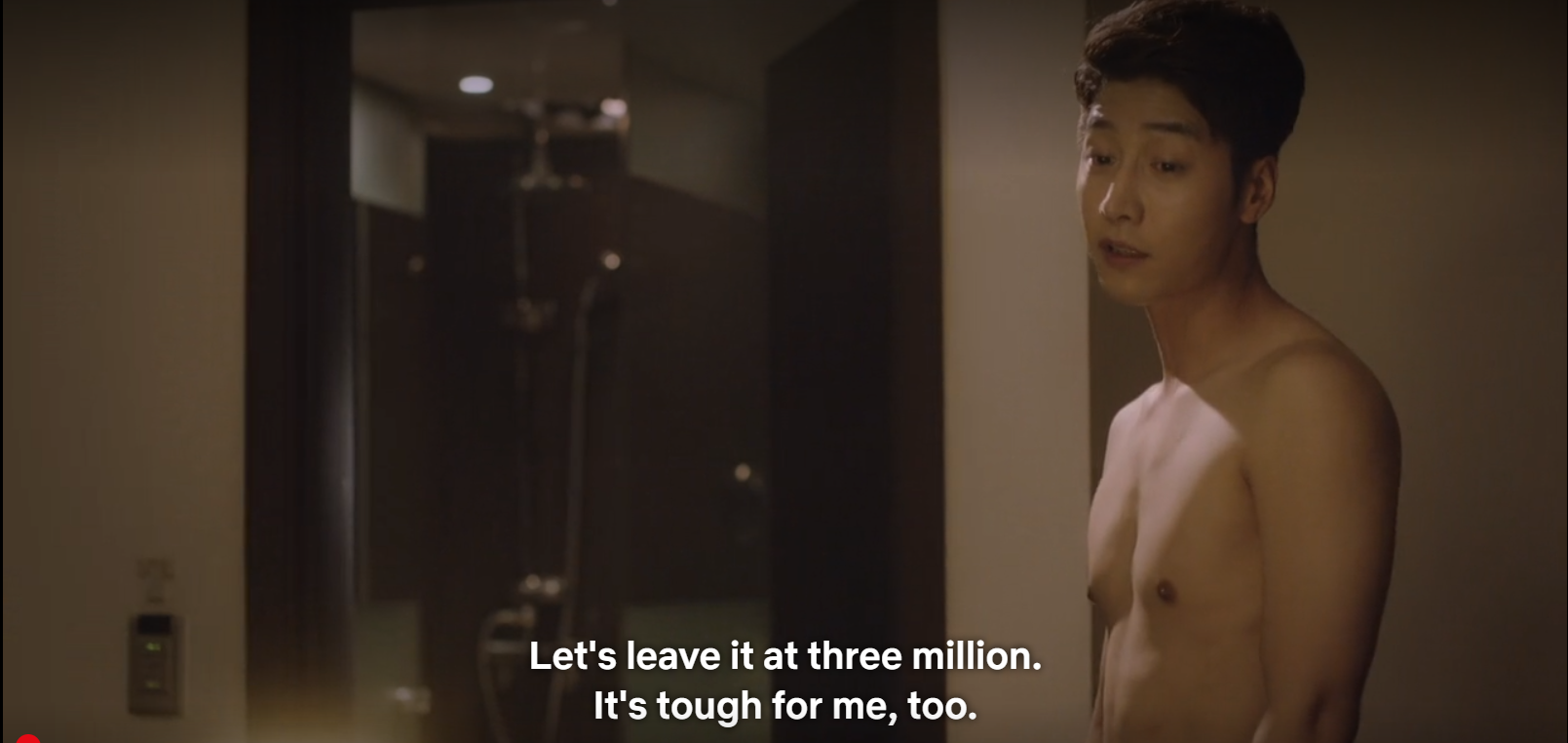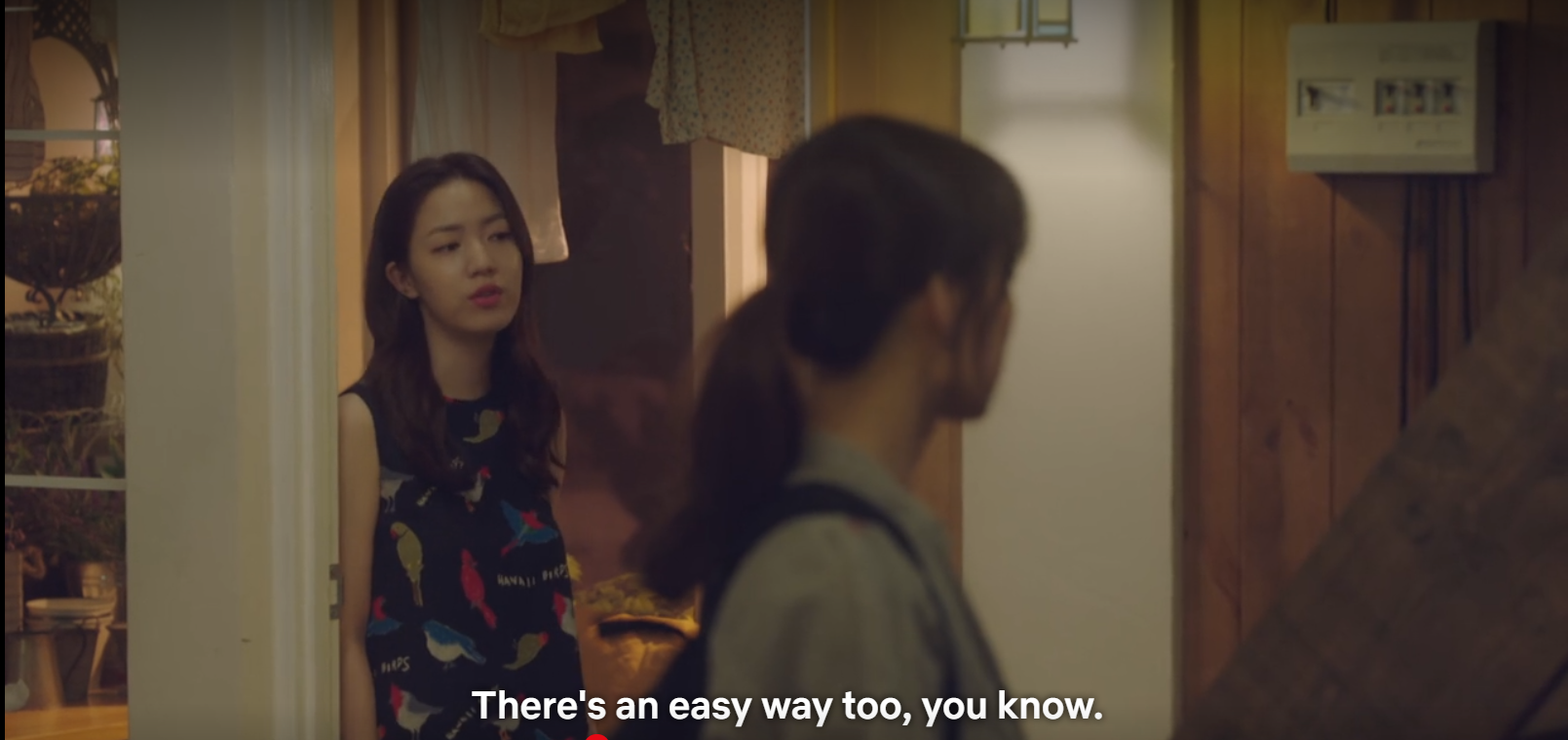by: Jasmine Kan
Episode 3: “I’ve Never Once Loved Myself #Rotten Roots”
 Screenshot of Yi-na’s boyfriends (Timestamp: 3:48)
Screenshot of Yi-na’s boyfriends (Timestamp: 3:48)
The episode focuses on three major points: Yi-na, the roommate’s behaviour and thoughts after finding out Yi-na was a “prostitute” and jealousy. For Yi-na, it is regarding her job as an ‘escort’ in terms of where and how she scouts for boyfriends, who her boyfriends are and her inner thoughts about her job. For the roommate’s reactions, Ye-eun is disgusted whereas the rest seem indifferent. As for jealousy, each roommate is jealous or envious of another roommate of a quality/life they have. This can be seen in a cyclic form where:
Ji-won is jealous of Ye-eun’s seemingly perfect relationship with her boyfriend.
Ye-eun is jealous of Yi-na’s ability to stand her ground with men.
Yi-na is jealous of Jin-myeong’s tenacity of not choosing the easy path like she did.
Jin-myeong is jealous of Eun-jae lack of financial worries.
Eun-jae is jealous of Ji-won’s ability to express her opinion openly.
Throughout the episode, prostitution is explored through the character Yi-na who is an ‘escort’. According to Lee Jinkyung, prostitution is “as a necessarily transnational phenomenon that exploits gender, class, race and national hierarchy” (Lee 2010: 4). Using this knowledge, this essay will explore how modern-day prostitution is portrayed through Yi-na.

Figure 1: Screenshot of Yi-na’s boyfriend limiting her expenses (Timestamp: 5:24)
Lee describes prostitution as a form of necropolitical labour due to its “disposable” (Ibid.: 6) nature. This nature can be seen through Yi-na’s self-imposed dispensability. She is ‘hired’ to be a rich man’s girlfriends via escorting and/or sexual services. In exchange, she is offered extremely high pay which she uses for her materialistic desires. Her job as an ‘escort’ is seen as “disposable” (Ibid.: 6) during the scene when one of her boyfriends lowers her spending limit (Figure 1) and she tells the audience it’s time to find someone new. Her ability to understand the nature of her job’s dispensability forces her to ‘dispose of’ herself out of any ‘relationships’ she enters, reinforcing the “disposable” (Ibid.: 6) nature of her labour.

Figure 2: Screenshot of Yi-na talking to Jin-myeong about the “easy way” (Timestamp: 26:21)
Additionally, Lee discusses how prostitution, from the worker’s perspective, is a “means of surviving” (Ibid.: 8). Coming from a lower-class family, Yi-na began at the social hierarchy’s lower end, already making it difficult to survive. However, by selling her body, she superficially climbs the social ladder and shows it via the materialistic goods she possesses. Although it appears her reason for escorting is for her materialistic desires, another reason is to avoid financial burden, making her form of surviving being living comfortably. This can be seen when she tells Jin-myeong “There’s an easy way” (Figure 2), showing a contrast between Yi-na and Jin-myeong on how they choose to survive.
Figure 3: Screenshot of Yi-na’s clothing in episode 3
Compared to the history of prostitution, Yi-na does not appear to be forced into her job. Although she is being exploited for her body, she is shown to be fully conscious of this exploitation. This can be seen when she is scouting her a new boyfriend in the lounge, demonstrating her freedom of choice when choosing whom to escort, unlike the prostitutes historically (Lie 1995). Surprisingly, she exploits her own body through her choice of clothing. She usually wears clothing to emphasize her legs, which is a form of beauty commodity in Korea (Epstein and Joo 2012), or body (Figure 3) to attract male attention. Her indulgence in this attention highlights autonomy in modern-day prostitution.
Overall, modern-day prostitution is portrayed as autonomous, disposable and a form of survival. Through Yi-na’s character, we see the benefits of this form of labour, however, the exploitation and unstable nature of it highlights the risks involve and how it may not be as different as to what prostitution is historically.
Word count: 446
Bibliography
Epstein, Stephen, and Rachael M. Joo. “Multiple Exposures: Korean Bodies and the Transnational Imagination.”The Asia-Pacific Journal 10, no. 1 (2012): 1-19.
Lee, Jin-kyung. Service Economies: Militarism, Sex Work, and Migrant Labor in South Korea. Minneapolis, Minnesota: University of Minnesota Press, 2010.
Lie, John. “The Transformation of Sexual Work in 20th-Century Korea.” Gender and Society 9, no. 3 (1995): 310-327.
Discussion Questions
Please note: Questions 1 and 2 can be controversial and offensive. Feel free to comment on other parts of the episode if you don’t feel comfortable discussing this topic.
- A lot of young women in North America talk about having a ‘Sugar Daddy’ to help fund their financial needs or materialistic desires, similar to Yi-na. What are your opinions in engaging in these activities? Is it an effective method?
- Escorting doesn’t always include sexual activity and can be considered a job based on the fact you are offering your time to earn money. However, because of the unconventional nature of it, it has a reputation of being “dirty”, as Ye-eun comments throughout the episode. Why do you think this reputation exists? Or, if you think its “dirty”, what is your reasoning behind it?
- As mentioned in the summary, there is a cycle of jealousy or envy within the Belle Epoque household. Interestingly, each of the qualities mentioned is something that creates an issue for the character possessing that quality, for example, because of Ji-won’s expressive and social justice nature, she is unable to get a boyfriend. Based on this cycle of jealousy and example, what is the episode trying to tell us?





Regards to the first and second discussion questions, I personally neither support the idea of finding a ‘sugar daddy’ nor oppose girls looking for a ‘sugar daddy’. I believe there is some ‘sugar daddy’ only want to find someone that is younger, more beautiful and more understanding compared to their wives. They are just lonely and want to find someone who can easily talk to. It could be an effective way to earn ‘easy money’. For example Yi-Na and Jin-Myeong, Yi-Na can afford all her materialistic desires and Jin-Myeong works almost every single days still is having a ‘hard life’. And I personally think it has a reputation of being ‘dirty’ as Ye-Eun mentions in this episode, from a health perspective is because of some sexually transmitted diseases. Especially in a shame culture society like Korean, having sexually transmitted diseases could be a really big deal and people would probably disgust you. And from an ethic perspective, people might think it is so wrong that girls are dating someone so much older and she does not love just for money which also reminds them of prostitution. But this is really controversial, it somehow depends on how you define the quality of life and what makes you feel satisfied.
The third discussion question I find it really interesting too. For example, Eun-Jae does not have financial worries because of her family support her emotionally and monetarily. However, maybe she is protected by her family so well when she first moved into Belle Epoque she did not know how to live with new people and she was really struggling with adapting new environment. Things usually do not go as perfect as we expected. If you want to gain some aspects of life you need to lose to exchange it.
LikeLike
In addition to Brittany’s comment about the reputation being “dirty,” in a non-health perspective, people might view the career in that way when looking through a traditional lens. Traditionally, the idea of saving yourself for one person was the “ideal.” Although I’m not sure, but this concept might still be ingrained in Asian societies as many are still quite conservative (when looking at laws passed, such as Taiwan being the first place in Asia to recognize same-sex unions, I think my assumption of Asia being more conservative is alright). So, the idea of pre-marital sex and even further, sex in exchange for money, is such a taboo topic and looked down upon by society. I think people have internalized this idea that something unconventional, such as sex for money and with out love, is then “dirty” or “improper.” It steers from the “correct” way and messes with how society should supposedly function.
LikeLike
Seeing how we discussed last class about young pregnancy and the taboos associated with being a single mother, I think it is safe to say that it is definitely looked down upon if engaging in sexual acts before marriage. I agree with Alex that the Korean culture looks down upon those who have pre-marital sex and thus, having sex for money is “dirty”. Although this is ironic as it seems to be an ‘issue’ prevalent enough for a drama to highlight this in one of its episodes. Therefore, it seems that “Age of Youth” wants to shed light on this topic and allow others to discuss the subject in a open setting as to not shun those who are in this line of work.
LikeLike
This episode emphasized a lot on the girl Kang Yi-Na. Yi-Na was accused of being a sex worker by her roommate Jung Ye-Eun, and to be honest I also consider her as a prostitute due to the fact that her behaviours matched many characters of being a prostitute – she is in a relationship with multiple man, and she received money in exchange of sex with these man. That is not a good behaviour in moral stand. Like Jasmine, the concept of “sugar daddy” and “sugar baby” also came out of my mind when I watched the behaviour of Yi-Na in the drama because both of them receiving financial support from men by offering sex and other accompany. However, these “sugar baby” has several major differences compare to Yi-Na, for instance, many of “sugar baby” which active in North America searching for financial support due to the pressure of high cost in college. Therefore the society is partly to be blamed for the action of these “sugar baby.” While Yi-Na lied to be a college student and she could work hard like her another roommate Yoon Jin-Myeong, but instead she is too greedy to choose an easier but debatable way to access money.
By the way, the dance of Korean college party is so interesting and different with the parties in Canada. The girl Song Ji-Won danced so well and freely and make me wondering if this unique dancing style popular in the real Korean parties.
LikeLike
In regards to the first and second discussion question, I do agree with Brittany that the work that Yi-na engages with is beneficial to both parties. I think that if it is mutually consented, I personally don’t see an issue with it. Although in practice there tends to be hidden parties (i.e. the wife of the sugar daddy) and that causes disputes. As with all work, you dedicate your time to your work and you get paid in exchange. I view the situation here the same although of course there are stigmas surrounding this because of the hidden parties that tend to be involved as well as the un-genuineness of this ‘fake relationship’. However, Yi-na does have criteria of her potential ‘boyfriends’ and like Jasmine says, does not behave as a traditional prostitute would. To address the third discussion question, I believe the saying “You want what you can’t have” rings true. Specifically in regards to, you don’t value what you have and you want what others have. However, you don’t realize that the same holds true for everyone else and thus, no one values their own worth. To put Brittany’s words into another saying, “You need to lose some to win some” and this is something we see constantly in this episode. The girls each have a character and their characters limit them which leads to jealousy as they wish to become in some aspects like the other girls.
LikeLike
Regarding the first question, I don’t think engaging in sex work is something to look down upon. Because of societal norms, the idea of getting financial support through unconventional ways, such as sexual favors, is seen as improper. It’s an extremely stigmatised career and I admire how resilient people who participate in such work are. They are faced with constant negativity and judgement, yet despite of all that they still provide their time. There are people who enjoy this uncommon work environment and as long as it is done safely and with consent, I think engaging in these activities should be allowed. Society views these people as objectifying their bodies, whereas these workers may see it as providing pleasure and guidance to those who need it. However, I believe those forced into this work or doing it because of unjust reasons should not be tolerated. These people have placed a bad reputation on the career when there’s no need for it.
LikeLike
I agree with Karina that it is because sex work is “controversial”, “taboo” but “common” in South Korea that the Age Of Youth presents the topic of sex and gives the audience space to discuss it. For a traditional country like South Korea, sex work is obviously despised by most people at present, but I think this kind of occupation is gradually being looked up to. For example, the young girl Kang Yi-na chooses to be someone else’s mistress. In this episode, although Yi-na’s career has been debased by Ye-eun, the other four people besides Yi-na are actually trying to understand and put themselves in other people’s shoes.
Personally, I don’t object to people choosing careers like “sugar baby” because that’s the way they want to live. But I wouldn’t encourage people to do that, because it’s a very risky profession and it sort of destroys other people’s families. However, with the fact that increasing social inequality and economic gap, will more and more people choose to such careers like “sugar baby” as a shortcut to higher classes, it’s still a question worth exploring.
LikeLike
Great essay and great discussion! Connection to academic sources is very well done here.
It is sad to see some people voluntarily choose to rely on “sugar daddys” for financial reasons. This issue is also known as “spon” in Korea (it’s abbreviation of “sponsor”.) Make sure keep an eye on the upcoming sex work lecture!
LikeLike
1. I guess it is an effective method for women, I know there is a fair bit of younger women who engage in such activities, usually women who don’t have much opportunities and a family support structure behind them. I am not fond of this concept and wish it was not necessary.
2. I think the reputation of dirty exists because it is still associated in the minds of many for prostitution. I don’t think its dirty so long as there aren’t sexual favors being exchanged.
3. I guess the episode is trying to tell us not to fall into bad cycles, and become aware of the things we are doing that get in the way of our happiness.
LikeLike